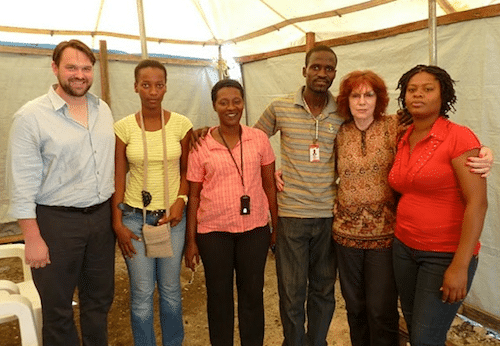Ending Gender-Based Violence in Haiti

The Goldin Institute believes in the power of communities coming together to build their own solutions and determine their own futures. Key to our achieving our mission is ensuring that voices and perspectives that are often excluded from the discussion—often women—are heard and included.
From combatting gender-based violence in Haiti to improving microcredit in Bangladesh, women-led, community-based projects are integral to the Goldin Institute's work around the world.
Rape Accountability and Prevention
 The Haiti Rape Accountability and Prevention Project (RAPP) is designed to respond to the epidemic of rapes against poor women and girls in Haiti in the wake of the Jan. 12, 2010 earthquake. The program includes four closely integrated components: legal advocacy, healthcare, organizing, and public advocacy.
The Haiti Rape Accountability and Prevention Project (RAPP) is designed to respond to the epidemic of rapes against poor women and girls in Haiti in the wake of the Jan. 12, 2010 earthquake. The program includes four closely integrated components: legal advocacy, healthcare, organizing, and public advocacy.
RAPP provides individual victims of sexual assault the legal services they need to obtain justice and compensation, while working with allies in Haiti and abroad to transform the social context that underlies the vulnerability of all poor Haitian women to assault. The Project also aims to deter future rape by punishing the perpetrators and forcing a more effective response by law enforcement and the justice system.
Bangladesh: Restoring Recipient Voices to Improve Microcredit

The current debate about the efficacy of microfinance is marked by the absence of those who have most at stake in the controversy: loan recipients. The Goldin Institute is working to lift up these voices, most often marginalized women, and restore their perspectives, insights and aspirations to the discussion.
Based on our innovative Community Based Oral Testimony methodology, where villagers in Bangladesh interviewed their neighbors about their experiences as loan recipients, we have helped capture and document these voices and are hard at work to ensure that they are heard in Bangladesh and around the world.
This community driven research raises many questions about the claims of gender empowerment made by microcredit supporters. In the words of Kohinoor Begum, Community Researcher and loan recipient herself:
[quote]Generally, credit is given in the name of the woman. The credit agencies do not grant credit if there is not a woman residing in the household. This is why male members of our homes or husbands sometimes force us to take credit. But, if we take credit, we have to hand it over to our husband or father-in-law who uses it in any way he wishes." [/quote]
Kohinoor went on to testify to the hidden perils that women like herself have experienced due to the misuse and exploitative practices taken by the lending institutions and the men of the communities in the rural villages where we conducted our research:
[quote]But, the NGO employees come to recover the money from us (women) and we have to face many insults and indignities ... It is the men who spend the money. But, payment of installment is sought from the women. We talk of women before all and talk of empowerment, but women are used within the traps and labyrinths of micro-credit. Women are deprived of their rights. Since women have begun taking micro-credit, oppression on her has multiplied. The evil practice of dowry became manifold. Because of micro-credit, social solidarity in villages is at stake." [/quote]
- Kohinoor Begum, Community Researcher
Rape Accountability and Prevention in Haiti
Executive Summary of the Project
Since the Jan. 12, 2010 earthquake in Haiti, women and girls living in the internally displaced persons camps face alarming rates of rape and other forms of gender-based violence. In many camps, the rate of gender-based violence has exploded to three times pre-earthquake levels. In the year since the earthquake, our partners at KOFAVIV have documented 640 cases of rape in 2010.
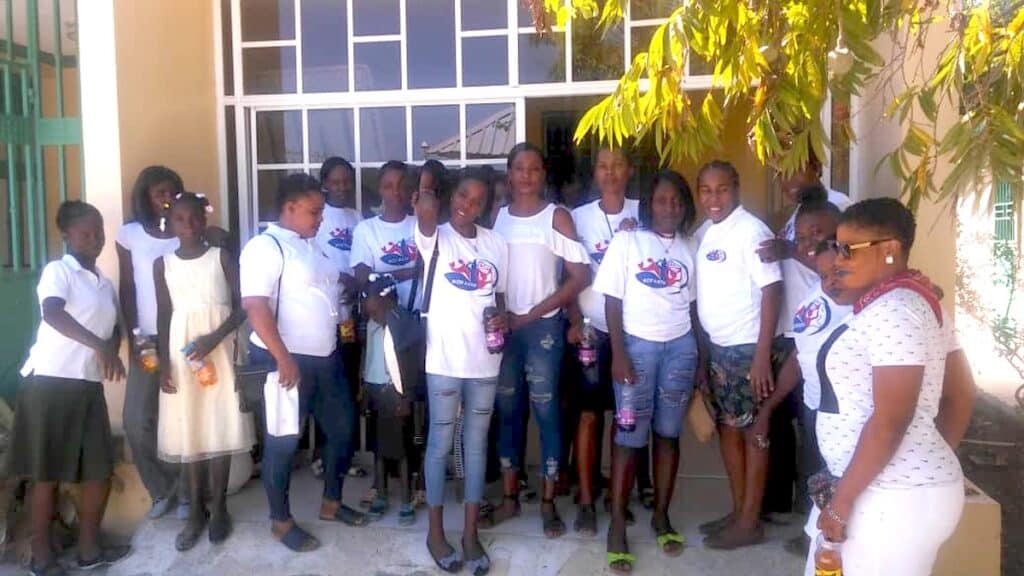
This pilot project is designed to provide security in the Place Petion community of Champ de Mars using women-led, community-based security teams to patrol the camp, discourage and disrupt incidents of gender-based violence and provide necessary escort services to vulnerable residents.
The Goldin Institute has partnered with KOFAVIV, FAVILEK, the Bureau des Avocats Internationaux (BAI), the Institute for Justice and Democracy in Haiti (IJDH) and its network of partners throughout Haiti to build and support a women-led, community-based pilot security platform in one representative displacement camp. This project builds on the strategy developed and implemented by KOFAVIV and FAVILEK, the GI's experience in creating grassroots partnerships for social change and the BAI / IJDH's capacity for legal advocacy in Haiti.
As part of the Rape Accountability and Prevention Project in Haiti, this security platform aims to prevent gender-based violence through the leadership and strategies of women's networks while the work of prosecution is ongoing. This pilot project is designed to serve as a model for community engagement and the provision of security that can be adopted by NGOs and the Government of Haiti.
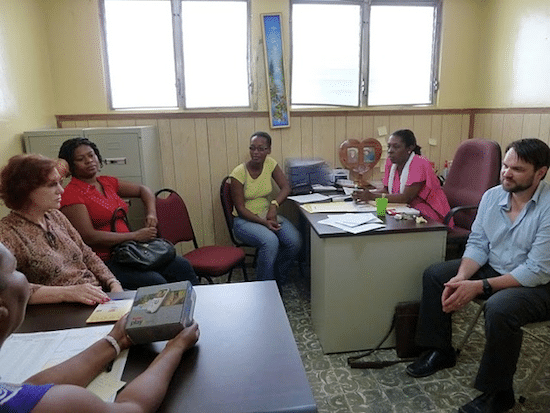
Project Rationale
The problem of GBV in post-earthquake Haiti must be understood within the broader context of the humanitarian response. There is a demonstrated lack of governmental response to sexual violence occurring in the camps. This failure to act appears to have two prongs—the Haitian Government lacks both the political will and the capacity to respond. Furthermore, despite billions of dollars being pledged by the international community for recovery, aid efforts have struggled to meet the basic needs of people living in IDP camps. Having no other options, Haitian grassroots women's groups have resorted to taking charge of their own security. Haitian women are both disproportionately impacted by the crisis and key to their country's recovery.
The reality is that grassroots women's groups have been mostly shut out from the process of crafting a response to the real threat of rapes in the camps. Meanwhile, they have mobilized their own solutions, distributing whistles to women living in camps and organizing groups of women to accompany each other to vulnerable locations like latrines, where many attacks have previously taken place. Each of the women engaged in the project brings a deep commitment to the work, and their life stories are a testament to that dedication.
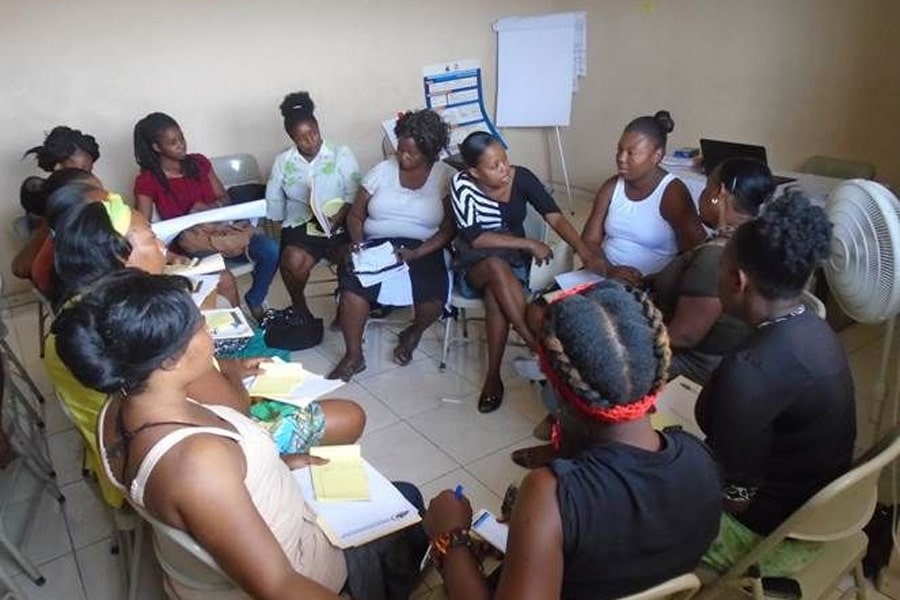
Brief History of the Project
The Haiti Rape Accountability and Prevention Project (RAPP) is designed to respond to the epidemic of rapes against poor women and girls in Haiti in the wake of the Jan. 12, 2010 earthquake. The program includes four closely integrated components: legal advocacy, healthcare, organizing, and public advocacy. RAPP provides individual victims of sexual assault the legal services they need to obtain justice and compensation, while working with allies in Haiti and abroad to transform the social context that underlies the vulnerability of all poor Haitian women to assault. The Project also aims to deter future rape by punishing the perpetrators and forcing a more effective response by law enforcement and the justice system. In February 2011, the Goldin Institute began its association with RAPP with the Camp Security and Sensitization Project.
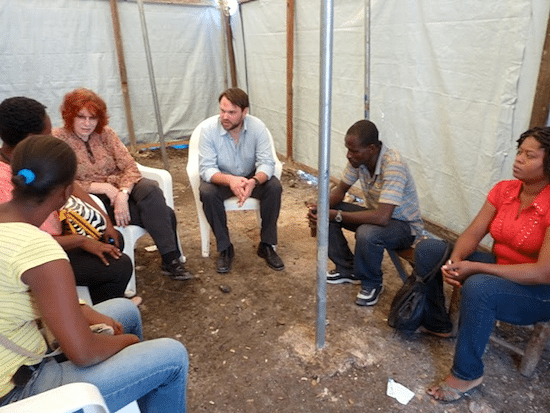
Shared Goals of the Project
This project seeks to substantially improve security and bring an end to gender-based violence in the camp where it is piloted in the Place Petion section of Champ de Mars. In addition to the immediate impact of improved security, we hope that it will provide some meaningful work for security providers and highlight the efficacy of partnering with community based groups, especially those led by women. We hope that this project will serve as a model for the Government of Haiti and relevant NGOs that will be able to scale up this important women-led, community-based initiative.
If successful, this project may also serve as a model for similar grassroots partnerships within the Goldin Institute's global network.
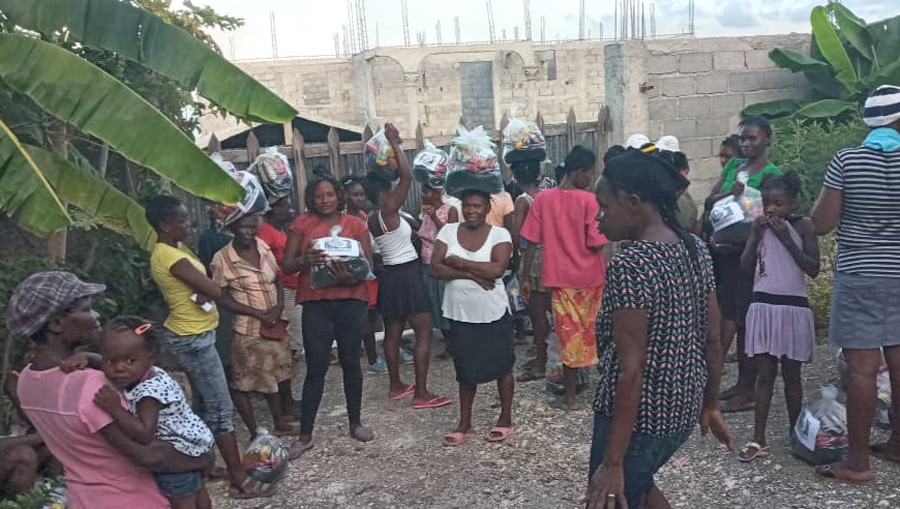
Project Outcomes
- Immediate and sustained reduction in gender-based violence in Champ de Mars.
- Improved sense of security for vulnerable people in Champ de Mars.
- Opportunity for women to design, lead and implement an innovative community based initiative.
- Increased cooperation between women's groups and the network of partners in Haiti.
- Augmented international profile for local partners through sharing the success of the project broadly.
- Opportunity to engage relevant parties in NGOs and the Government to educate them on the need and efficacy of working with grassroots groups, especially women's groups.
